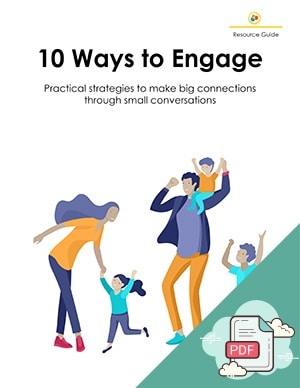As parents, we can all likely agree that education is central to enabling the success of our children. Education is not just something that happens at school. It starts at home.
When children are born, they’re much like sponges. They want to learn and know everything. If we foster their curiosity, their thirst for knowledge will continue throughout their life. One way we can foster their curiosity is to encourage children to read.
When they are old enough, we send them to school and spend countless hours (and often a lot of money) to make sure they are afforded the opportunities that education provides. A key to ensuring kids are successful in school is the engagement and interaction we have with their teachers.
Last year we shared a number of ideas about how you can make a difference in your child’s education at school. The blog post 3 Secrets to Better Parent Involvement in Education and our Family Bonding Challenge about ways to strengthen parent-teacher communication are good examples. We hope that you took advantage of the ideas they suggest and that your kids are doing great in school!
Unfortunately, the information published earlier this year by the National Assessment of Educational Progress (NAEP) which tracks educational progress for our kids at the fourth, eighth, and twelfth grade level shows that what we want as parents and how our kids are doing is not aligned and should be a wake-up call for all of us.
According to NAEP, “Average scores for 13-year-olds declined 4 points in reading and 9 points in math compared to the long-term-trend assessments administered in 2020. When compared to a decade ago, scores slid even further—7 points in reading and 14 points in math.”
In addition, it stated, “Results show 37 percent of fourth-grade students nationally are below the NAEP Basic level in reading in 2022 and the average mathematics score for fourth-grade students in 2022 was 5 points lower than in 2019.”
Our children’s success in education is dependent on what goes on in the classroom and our personal engagement as parents. Educating our kids is our responsibility.
So, what’s a parent to do? In addition to what they recommend, I would suggest that one of the most important actions we can take is to encourage children to read more than they do today. Those who can read at or above proficiency level do better in school and in life!
One piece of information from Forbes shows that the average annual income of adults who read at proficiency level is 30% higher than those who are just below the proficiency level and 50% higher than those with the lowest levels of reading proficiency.
One of my favorite quotes about the importance of reading comes from Dr. Seuss, “The more that you read, the more things you will know, the more that you learn, the more places you’ll go.” Mark Cuban and Warren Buffet are also both prolific readers and believe it is the key to success.
The good news is that as parents, nearly 8 in 10 of us read to our child before their first birthday. As parents, we enjoy it, and so do our kids. So, for most of us and our kids, we start out doing the right thing in giving our kids a strong start by reading. Unfortunately, by the time our kids become teenagers, over 80% don’t read for self-interest on a daily basis.
Reading plays a very important role in our ability to gather information, process that information, come to understandings or conclusions about what it all means, and make decisions about how to process what we know and understand.
That ability is called cognitive thinking. When we look at the development of our children, cognitive skills are one of the five areas of development used to track how well our children are doing. The other four are physical, emotional, social, and life skills.
Reading, like learning to ride a bike, playing a sport, or playing a musical instrument, lights up the brain in a profound way. When we ride a bike, we have to maintain balance, move our muscles in coordination, and watch to make sure we don’t run over or into something. It is a multisensory activity that we love to do and so does our brain.
Reading, in its simplest form, requires us to take a series of letters on a page and translate them into something we can understand. Our brain loves that. The neurons, synapse, and axons in the brain go wild when we read.
Further, it causes us to create images that our eyes can’t see when the words on the pages come to life. It causes us to think about and consider the implications of what the written words really mean.
While it may not be as exciting to our bodies as riding a bike, it feeds the hunger we have for knowledge, insight, and perspective. The more we read, the more we learn, the more we know, or as Dr. Seuss says, “The more places you’ll go.”
1. Be the Model

If your kids see you reading, they are more likely to read as well.
2. Set Aside Time to Read Together

As your kids get older and can read on their own, set aside the time that you used to read to them as time to sit together and read. You might even read the same book and start a family book club.
Audiobooks in the car are an easy and convenient way to share stories together as well.
3. Encourage Audiobooks

Many libraries offer free access to apps like Hoopla or Libby which make finding new book afforable and convenient.
4. Go to the Library as a Family

Going to the library together provides a great way for you and your children to talk about what interests them and for you to help them find the books they want to read.
Most libraries offer a wide range of free public activities as well. So even if your child isn’t interested in picking up a book the first few times you visit, over time they will likely get more intersted the more often you visit.
Reading More Will Help with Life-Long Success
When we make time for reading and make it a priority for our kids, they sharpen critical thinking and cognitive skills, which are so important to life-long success.
Find out if your child is reading on par with their age by talking with their teachers. Help them find books of interest to them and then read with them.
It will make a huge difference in your life and theirs.
Free Resource Guide
10 Ways to Engage
Practical strategies to make big connections through small conversations
What To Do Next
1. Read more in the blog:
The Family Wisdom Blog shares valuable ideas across diverse topics.
2. Explore the Printables Library:
Our printables library is filled with must-have activity ideas, checklists, guides, and workbooks.
3. Subscribe to Our Newsletter:
Sign up for our newsletter for parenting tips to help you create the family team you've always wanted.
Rick Stephens
Rick Stephens is a co-founder of Raising Families. With 33 years of experience as a top-level executive at The Boeing Company and having raised four children of his own, he is able to support parents and grandparents by incorporating his knowledge of business, leadership, and complex systems into the family setting.
In his free time Rick enjoys road biking, scuba diving, visiting his grandkids, and generally trying to figure out which time zone he’s in this week. Read full bio >>






